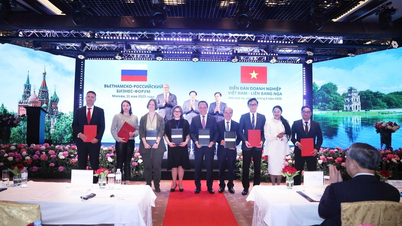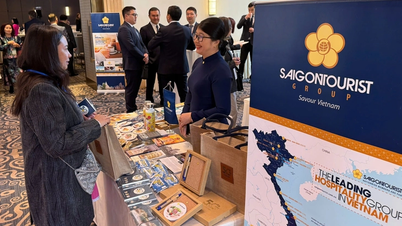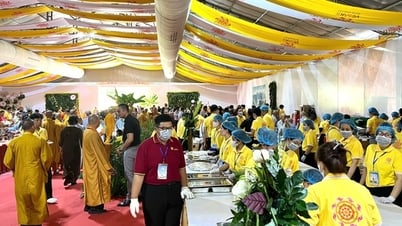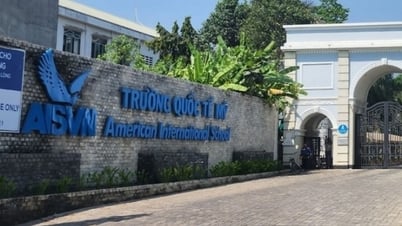
Representative of Hand in Hand for International Talents project (Germany) shares labor recruitment information at the workshop on March 12 - Photo: TRONG NHAN
On March 12, Saigontourist College of Tourism and Hospitality (HCMC) held a seminar with representatives of schools and international employers who are looking to recruit students and workers in the profession.
Ms. Nguyen Hong Ngoc Lam, in charge of the Hand in Hand for International Talents (Germany) project in Vietnam, said the project is open to young Vietnamese people, who only need to graduate from high school to be able to go to Germany to work.
The project is funded by the German Ministry of Economic Affairs and Climate Protection and accepts applications from many fields, including hotels, restaurants, and kitchens. Young people are sponsored 100% of the costs of procedures, visas, and German language tuition. Applicants only have to pay for airfare to Germany.
Ms. Lam informed that when you arrive in Germany, you will work at German enterprises participating in the project and receive the same salary as German workers. The current salary for kitchen positions ranges from 2,600 - 2,800 euros/month (70 - 75 million VND/month), and hotel positions range from 2,300 - 2,500 euros/month (61 - 67 million VND/month).
"According to current regulations, after 3 years of working you will have the right to apply for permanent residence and after 5 years you will have the right to apply for German citizenship," said Ms. Lam.
According to her, the reason for such incentives to attract foreign workers is because Germany is lacking labor in many fields. It is estimated that each year, Germany needs 400,000 immigrant workers to meet the labor demand in Germany.

Immigrant workers in the hotel and restaurant industry in Germany - Photo: DW
Meanwhile, Ms. Le Minh Thuy, deputy director of Haio Education, informed that recently, every month the unit receives requests to order labor from Japanese enterprises and unions in the restaurant and hotel sector. Some Japanese companies order labor 1-2 months in advance, some companies request half a year in advance.
Ms. Thuy gave an example of a recent job order from a large restaurant chain in Tokyo. Every week, whenever there is a candidate, they will interview them online, then interview them in person and give them an internship at their restaurant in Vietnam before going to Japan.
"The first contract between candidates and Japanese businesses usually lasts 5 years, at the end of which it can be extended and workers can apply for a permanent visa. The salary in the hotel and restaurant industry here ranges from 38 to 42 million VND/month. Entry only requires a secondary school degree," said Ms. Thuy.
In addition to Japan, Ms. Thuy has noticed that the French market is also in great need of Vietnamese workers in the restaurant and hotel industry. The positions that need international workers are very diverse, from kitchen, reception, service to dishwashing.
Typically, last week, an Italian chain of stores in France contacted her unit to offer labor supply. The salary ranges from 1,800 - 2,000 euros/month (40 - 53 million VND/month), not including other benefits.
However, because France requires workers to return home at the end of their contract, candidates will have to pay an additional "deposit against escape". The money will be refunded when the candidate's contract ends and they return home.

Mr. Thai Dung Tam, admissions manager of New Era Academy (Australia), shares opportunities to study vocational training in Australia - Photo: TRONG NHAN
Trends in studying abroad and working
Mr. Thai Dung Tam, admissions manager of New Era Academy (Australia), said that in recent years, more and more young people have chosen to study abroad for vocational training instead of just wanting to study abroad at the undergraduate or postgraduate level.
He said that in Vietnam, young people still have prejudices about vocational training compared to university, but in Australia there is almost no distinction between these two levels of education. Even the salary of "workers" in Australia in many places is equal to or higher than that of office workers.
Currently, vocational students study directly at school 2 days/week. The remaining days, they do internships at businesses.
In the context of Australia "tightening" student visas, Mr. Tam advises students who intend to study in Australia to follow this roadmap.
He explained that normally, students who graduate from grade 12 will continue to study at vocational schools, which is the "normal" path. However, if students who have graduated from university go to Australia to study vocational training, meaning studying at a lower level, they will easily be questioned by the authorities when considering visas.
Source



![[Photo] Prime Minister Pham Minh Chinh and Prime Minister of the Kingdom of Thailand Paetongtarn Shinawatra attend the Vietnam-Thailand Business Forum 2025](https://vphoto.vietnam.vn/thumb/1200x675/vietnam/resource/IMAGE/2025/5/16/1cdfce54d25c48a68ae6fb9204f2171a)































![[Photo] President Luong Cuong receives Prime Minister of the Kingdom of Thailand Paetongtarn Shinawatra](https://vphoto.vietnam.vn/thumb/1200x675/vietnam/resource/IMAGE/2025/5/16/52c73b27198a4e12bd6a903d1c218846)






























































Comment (0)